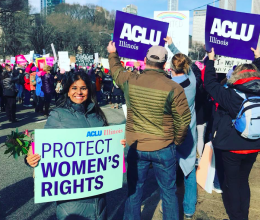Testimony of Jenna Prochaska, ACLU of Illinois, to Chicago City Council Committee on License and Consumer Protection, Wednesday, March 21, 2018
Housing security and unfettered access to police assistance are essential to the safety of survivors of domestic violence, victims of crime, individuals with disabilities, and other vulnerable tenants. Nuisance ordinances like Section 8-4-87 of the Municipal Code of Chicago place these groups at risk by using 911 calls as the basis for punitive enforcement. In practice, we know that landlords respond to the threat of penalties imposed by ordinances like this one by evicting tenants, refusing to renew leases, or instructing tenants not to call 911.
As a result, victims are faced with the impossible choice between suffering through violence and threats and calling the police which could lead to homelessness. This undermines public safety, fuels housing instability, and punishes innocent people. Even without enforcement by the City, having this ordinance on the books harms tenants and undermines public safety efforts by discouraging residents from calling 911 for help. We know that carve-outs like those in Proposed Ordinance 89 are not sufficient to prevent harm, because police calls related to domestic violence and disabilities are often not clearly identified.



